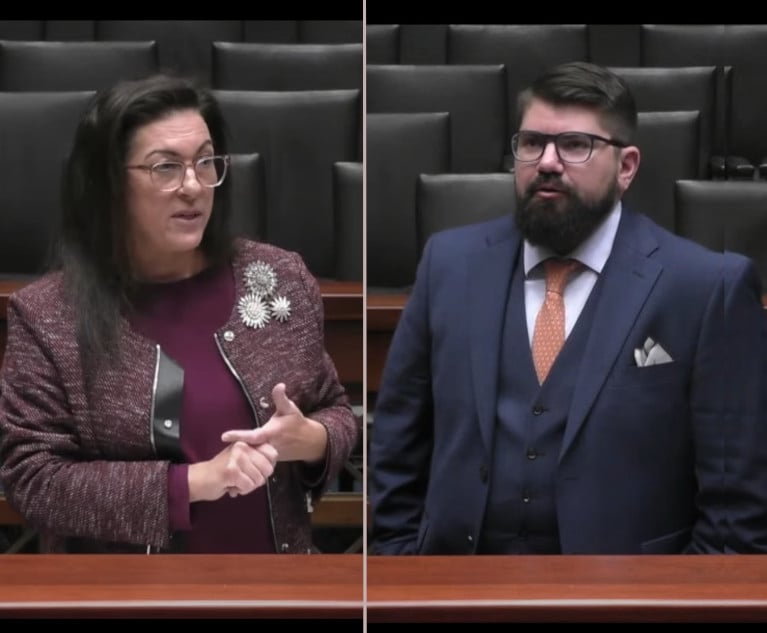Federal Appeals Court Strikes Down EEOC Criminal Background Guidance In Texas: Three Things For Employers To Know
A federal appeals court ruled on August 6 the Equal Employment Opportunity Commission's (EEOC) 2012 guidance document cautioned employers not to…
November 05, 2019 at 03:00 PM
7 minute read
 Hollie Reiminger, Fisher Phillips, Houston office. (Courtesy photo)
Hollie Reiminger, Fisher Phillips, Houston office. (Courtesy photo)
A federal appeals court ruled on August 6 the Equal Employment Opportunity Commission's (EEOC) 2012 guidance document cautioned employers not to apply blanket bans against hiring those with criminal records could not be enforced against the state of Texas, handing the agency a stinging loss. The sweeping decision from the Fifth Circuit Court of Appeals calls into question not only the future of the guidance as applied to other employers across the country, but also the EEOC's power to issue such guidance in the first place. Here are three things all employers should know about the ruling.
Court Rejects Application Of Guidance Against Texas
The EEOC's guidance was controversial from the start. In April 2012, the Obama-era EEOC released its "Enforcement Guidance on the Consideration of Arrest and Conviction Records in Employment Decisions Under Title VII." It concluded blanket bans on hiring those with criminal records disproportionately impact racial and ethnic minorities, which could lead to Title VII disparate impact liability. Therefore, according to the guidance, those employers who chose to apply blanket bans would provide a basis for the agency to further investigate and possibly bring a charge of discrimination.
While the guidance further stated employers could escape liability by demonstrating the policy or practice of not hiring those with criminal backgrounds was "job related for the positions in question and consistent with business necessity," the bar to meet this standard was set very high. It would not be enough, the EEOC said, to simply show an employer had a racially balanced workforce. Instead, employers would have the burden of showing their policy or practice operated to effectively link specific criminal conduct with the risks inherent in the duties of the position in question.
The guidance proved immediately controversial, not just because of its broad scope, but also because many questioned whether the agency had the power to issue it in the first place. This was not a formal regulation issued after a standard notice-and-comment period, but instead a unilateral announcement from the agency. Moreover, Congress has only granted the EEOC with the power to issue "procedural" regulations implementing Title VII, and the agency does not have the ability to promulgate substantive rules.
One of the first employers that found itself under the EEOC's microscope after the guidance was published was the state of Texas. The state had long excluded persons with felony convictions from many public jobs. One such applicant brought a charge with the EEOC after being rejected for a position with the Texas Department of Public Safety, which categorically excluded all convicted felons from employment. After the EEOC took up the fight on the applicant's behalf, Texas fought back and argued the guidance should be struck down because the agency did not have the power to issue such a broad rule.
On August 6, the Fifth Circuit agreed with Texas and upheld an injunction barring the EEOC from enforcing the guidance against the state. The appeals court ruled the EEOC "overstepped its statutory authority" in issuing the guidance because it lacks the authority to promulgate substantive rules implementing Title VII.
Other Employers Should Tread Carefully
While the court decision is quite decisive, it is also narrowly applied: only the state of Texas – not all employers located in Texas – is protected from EEOC enforcement actions as a result of this ruling. While it does bode well for employers in the Fifth Circuit's jurisdiction (those in Texas, Louisiana and Mississippi), and it appears likely this same line of reasoning would be applied by the Court of Appeals or any lower federal court in Texas, Louisiana or Mississippi faced with a Title VII challenge to a criminal history hiring prohibition, employers in these areas should tread cautiously for now.
While this decision challenges the EEOC's ability to issue this guidance about the lawfulness of blanket criminal history exclusion policies and practices, such policies or practices could still be found by a court to be discriminatory depending on the circumstances of that particular situation and result in liability for the employer. You should coordinate with your labor and employment counsel to understand the scope of this ruling and how it would apply to your specific situation.
As for employers outside of the Fifth Circuit's reach, the August 6 ruling might be considered a step in the right direction, but by no means will it offer you any protection should your hiring practices be challenged as a result of the EEOC's guidance. The ruling is limited to the state of Texas, and the injunction barring enforcement activity only shields the state. The best-case scenario is you and your counsel can use the reasoning applied by the Fifth Circuit to your own situation and the court hearing your matter will find the ruling persuasive.
Another consideration is whether this ruling would have any impact on your operations at all, even if applied to your hiring practices. Many employers have already adapted to the EEOC's guidance over the past seven years and take a more holistic approach to hiring today than they did in 2012. Part of the rationale for such a position may be the tight job market, or it could also reflect a different approach to identifying viable candidates for hire. Moreover, a good number of employers also operate in jurisdictions with a "ban the box" law preventing them from inquiring about criminal histories at certain points during the hiring process.
The EEOC Has Been Put On Notice
Finally, while this ruling might be limited to the state of Texas, the consequences of the court's words might reverberate for years to come. By pointedly stating the EEOC "overstepped its authority" and "lacks authority" to promulgate such a rule, and the employer in this case can essentially ignore the work of an enforcement agency, the Fifth Circuit may have created more problems for the agency. This ruling is consistent with other federal decisions and administrative actions we have seen in recent years to roll back certain Obama-era initiatives deemed to be overreaching or inconsistent with pre-Obama era legal authority.
There is little doubt employers across the country were keenly observing this case and the arguments set forth by the state of Texas, and are now prepared to weaponize the words published by the federal appeals court for their own benefit. Other agency guidance documents will certainly be scrutinized by employers and their attorneys to determine whether they, too, will be subject to similar challenges and could be next in line to be struck down.
This ruling may force the EEOC to proceed gingerly when issuing further guidance outside of the normal notice-and-comment process, recognizing that a group of employer advocates will be ready to pounce if they perceive the guidance falls into the same category as this criminal background publication.
Hollie Reiminger, of counsel in the Fisher Phillips Houston office, focuses her labor and employment practice at the intersection of business and workplace issues. She counsels clients on wage and hour compliance, state and federal leave laws, Americans with Disabilities Act accommodation requirements, workplace investigations, EEOC charge responses, I-9 compliance, drug testing and employee discipline and terminations.
This content has been archived. It is available through our partners, LexisNexis® and Bloomberg Law.
To view this content, please continue to their sites.
Not a Lexis Subscriber?
Subscribe Now
Not a Bloomberg Law Subscriber?
Subscribe Now
NOT FOR REPRINT
© 2025 ALM Global, LLC, All Rights Reserved. Request academic re-use from www.copyright.com. All other uses, submit a request to [email protected]. For more information visit Asset & Logo Licensing.
You Might Like
View All
Houston Appeals Court Split Over Race Discrimination Suit Involving COVID-19 Vaccine Distribution
4 minute read
Overtime Rewind: Texas Court Ruling Unravels FLSA Salary Level Increases
4 minute read
'It's Like They Lynched You:' Law Professor's Discrimination Claim Reaches High Court
7 minute readTrending Stories
- 1'It's Not Going to Be Pretty': PayPal, Capital One Face Novel Class Actions Over 'Poaching' Commissions Owed Influencers
- 211th Circuit Rejects Trump's Emergency Request as DOJ Prepares to Release Special Counsel's Final Report
- 3Supreme Court Takes Up Challenge to ACA Task Force
- 4'Tragedy of Unspeakable Proportions:' Could Edison, DWP, Face Lawsuits Over LA Wildfires?
- 5Meta Pulls Plug on DEI Programs
Who Got The Work
Michael G. Bongiorno, Andrew Scott Dulberg and Elizabeth E. Driscoll from Wilmer Cutler Pickering Hale and Dorr have stepped in to represent Symbotic Inc., an A.I.-enabled technology platform that focuses on increasing supply chain efficiency, and other defendants in a pending shareholder derivative lawsuit. The case, filed Oct. 2 in Massachusetts District Court by the Brown Law Firm on behalf of Stephen Austen, accuses certain officers and directors of misleading investors in regard to Symbotic's potential for margin growth by failing to disclose that the company was not equipped to timely deploy its systems or manage expenses through project delays. The case, assigned to U.S. District Judge Nathaniel M. Gorton, is 1:24-cv-12522, Austen v. Cohen et al.
Who Got The Work
Edmund Polubinski and Marie Killmond of Davis Polk & Wardwell have entered appearances for data platform software development company MongoDB and other defendants in a pending shareholder derivative lawsuit. The action, filed Oct. 7 in New York Southern District Court by the Brown Law Firm, accuses the company's directors and/or officers of falsely expressing confidence in the company’s restructuring of its sales incentive plan and downplaying the severity of decreases in its upfront commitments. The case is 1:24-cv-07594, Roy v. Ittycheria et al.
Who Got The Work
Amy O. Bruchs and Kurt F. Ellison of Michael Best & Friedrich have entered appearances for Epic Systems Corp. in a pending employment discrimination lawsuit. The suit was filed Sept. 7 in Wisconsin Western District Court by Levine Eisberner LLC and Siri & Glimstad on behalf of a project manager who claims that he was wrongfully terminated after applying for a religious exemption to the defendant's COVID-19 vaccine mandate. The case, assigned to U.S. Magistrate Judge Anita Marie Boor, is 3:24-cv-00630, Secker, Nathan v. Epic Systems Corporation.
Who Got The Work
David X. Sullivan, Thomas J. Finn and Gregory A. Hall from McCarter & English have entered appearances for Sunrun Installation Services in a pending civil rights lawsuit. The complaint was filed Sept. 4 in Connecticut District Court by attorney Robert M. Berke on behalf of former employee George Edward Steins, who was arrested and charged with employing an unregistered home improvement salesperson. The complaint alleges that had Sunrun informed the Connecticut Department of Consumer Protection that the plaintiff's employment had ended in 2017 and that he no longer held Sunrun's home improvement contractor license, he would not have been hit with charges, which were dismissed in May 2024. The case, assigned to U.S. District Judge Jeffrey A. Meyer, is 3:24-cv-01423, Steins v. Sunrun, Inc. et al.
Who Got The Work
Greenberg Traurig shareholder Joshua L. Raskin has entered an appearance for boohoo.com UK Ltd. in a pending patent infringement lawsuit. The suit, filed Sept. 3 in Texas Eastern District Court by Rozier Hardt McDonough on behalf of Alto Dynamics, asserts five patents related to an online shopping platform. The case, assigned to U.S. District Judge Rodney Gilstrap, is 2:24-cv-00719, Alto Dynamics, LLC v. boohoo.com UK Limited.
Featured Firms
Law Offices of Gary Martin Hays & Associates, P.C.
(470) 294-1674
Law Offices of Mark E. Salomone
(857) 444-6468
Smith & Hassler
(713) 739-1250







